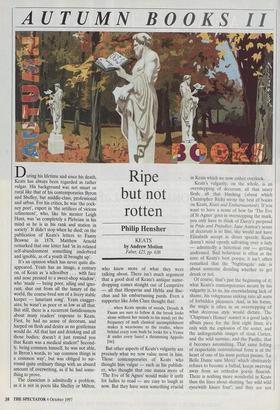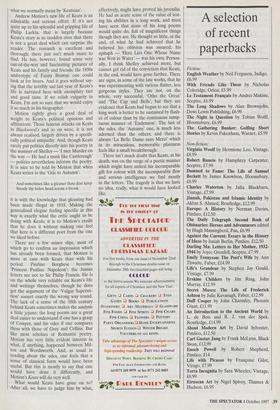AUTUMN BOOKS II
Ripe but not rotten
Philip Hensher
KEATS by Andrew Motion Faber, £25, pp. 636 During his lifetime and since his death, Keats has always been regarded as rather vulgar. His background was not smart or rural like that of his contemporaries Byron and Shelley, but middle-class, professional and urban. For his critics, he was 'the cock- ney poet', expert in 'the artifices of vicious refinement', who, like his mentor Leigh Hunt, was 'as completely a Plebeian in his mind as he is in his rank and station in society'. It didn't stop when he died; on the publication of Keats's letters to Fanny Brawne in 1878, Matthew Arnold remarked that one letter had 'in its relaxed self-abandonment something underbred and ignoble, as of a youth ill brought up'.
It's an opinion which has never quite dis- appeared. Yeats has an image, a century on, of Keats as 'a schoolboy . . . with face and nose pressed to a sweet-shop window', who 'made — being poor, ailing and igno- rant, shut out from all the luxury of the world, the coarse-bred son of a livery stable keeper — luxuriant song'. Yeats exagger- ates; he wasn't as poor or as low as all that. But still, there is a recurrent fastidiousness about many readers' response to Keats. First, he had no sense of decorum, and harped on flesh and desire as no gentleman would do. All that lust and drinldng and all those bodies; doesn't it just remind you that Keats was a medical student? Second- ly, being common himself, he was not able, in Byron's words, to 'say common things in a common way', but was obliged to sur- round quite ordinary things with an absurd amount of overwriting, as if he had some- thing to prove.
The classicism is admittedly a problem, as it is not in poets like Shelley or Milton, who knew more of what they were talking about. There isn't much argument that a good deal of Keats's antique name- dropping comes straight out of Lempriere — all that Hesperus and Hybla and Bac- chus and his embarrassing pards. Even a supporter like John Clare thought that:
... when Keats speaks of woods, Dryads & Fauns are sure to follow & the brook looks alone without her naiads to his mind; yet the frequency of such classical accomplishment makes it wearisome to the reader, where behind every rose bush he looks for a Venus & under every laurel a thrumming Appollo [sic].
But other aspects of Keats's vulgarity are precisely what we now value most in him. Those contemporaries of Keats who thought him vulgar — such as his publish- er, who thought that one stanza more of 'The Eve of St Agnes' would make it unfit for ladies to read — are easy to laugh at now. But they have seen something crucial in Keats which we now rather overlook.
Keats's vulgarity, on the whole, is an overstepping of decorum; all that saucy flesh, all that blushing (about which Christopher Ricks wrote the best of books on Keats, Keats and Embarrassment). If you want to have a sense of how far 'The Eve of St Agnes' goes in overstepping the mark, you only have to think of Darcy's proposal in Pride and Prejudice. Jane Austen's sense of decorum is so fine, she would not have Elizabeth accept in direct speech; Keats doesn't mind openly salivating over a lady — admittedly a historical one — getting undressed. Bad behaviour is often at the core of Keats's best poems; it isn't often remarked that the 'Nightingale' ode is about someone deciding whether to get drunk or not.
Of course, that's just the beginning of it; what Keats's contemporaries meant by his vulgarity is, to us, his overwhelming lack of shame, his voluptuous sinking into all sorts of forbidden pleasures. And, in his forms, the magic is often in an overstepping of what decorous style would dictate. The 'Chapman's Homer' sonnet is a good lady's album piece for the first eight lines; it's only with the explosion of the sestet, and the unforgettable images of stout Cortez, and the wild surmise, and the Pacific, that it becomes astonishing. That same foiling of respectable conventional form is at the heart of one of his most perfect poems, 'La Belle Dame sans Merci' which obstinately refuses to become a ballad, keeps swerving away from an orthodox poetic flourish. There is nothing more wonderful in Keats than the lines about shutting 'her wild wild eyes/with kisses four'; and they are not what we normally mean by `Keatsian'.
Andrew Motion's new life of Keats is an admirable and serious effort. If it's not quite up to his splendid and gripping life of Philip Larkin, that is largely because Keats's story is so trodden over that there is not a great deal which can surprise the reader. The research is excellent and thorough; there just isn't much more to find. He has, however, found some very out-of-the-way and fascinating pictures of Keats and his family and friends; the 1850s ambrotype of Fanny Brawne one could look at for hours. And it goes without say- ing that the terribly sad last year of Keats's life is narrated here with exemplary tact and good taste. If we relish vulgarity in Keats, I'm not so sure that we would enjoy it so much in his biographer.
Motion rightly gives a good deal of weight to Keats's political opinions and affiliations. Those famous attacks on Keats in Blackwood's and so on were, it is not always realised, largely driven by a specifi- cally political antipathy. And, though Keats rarely put politics directly into his poetry in the manner of Shelley — 'I met Murder on the way — He had a mask like Castlereagh' — politics nevertheless informs the poetry. It is nice to be told by Motion that when Keats writes in the 'Ode to Autumn':
And sometimes like a gleaner thou dost keep Steady thy laden head across a brook
it is with the knowledge that gleaning had been made illegal in 1818. Making the generalised elegiac feeling specific in this way is exactly what the critic ought to be doing with Keats; it is to Motion's credit that he does it without making one feel that here is a different poet from the one we liked before.
There are a few minor slips, most of which go to confirm an impression which has already been formed, that Motion is more at ease with Keats than with his period. Pauline Borghese becomes 'Princess Pauline Napoleon'; the Junius letters are not to Sir Philip Francis. He is an the whole very reliable on Keats's life and writings themselves, though he does get the argument of the 'Vulgar Supersti- tion' sonnet exactly the wrong way round. The lack of a sense of the 18th century behind Keats sometimes makes the analysis a little jejune; the long poems are a great deal easier to understand if one has a grasp of Cowper, and his odes if one compares them with those of Gray and Collins. But like most scholars of Romantic poetry, Motion has very little evident interest in what, if anything, happened between Mil- ton and Wordsworth. And, as usual in reading about the odes, one feels that a sense of classical form would have been useful. But this is mostly to say that one would have done it differently, and Motion's Keats will do very well.
What would Keats have gone on to? After all, we have to judge him by what, effectively, might have proved his juvenilia. He had an acute sense of the value of test- ing his abilities in a long work, and must have seen that none of his long poems would quite do, full of magnificent things though they are. He thought so little, at the end, of what he had achieved that he believed his oblivion was assured; his epitaph — 'Here Lies One Whose Name was Writ in Water' — was his own. Person- ally, I think Shelley achieved more, but cannot get rid of the conviction that Keats, in the end, would have gone further. There are signs, in some of the late works, that he was experimenting with various flatter, less gorgeous styles. They are not, on the whole, very successful, `Otho the Great' and 'The Cap and Bells', but they are evidence that Keats had begun to see that a long work is better to be sustained by flash- es of colour than by the continuous sump- tuous manner of `Endymion'. The last of the odes, the 'Autumn' one, is much less adorned than the others; and there is always 'La Belle Dame sans Merci' which in its miraculous, memorable plainness feels like a small breakthrough.
There isn't much doubt that Keats, at his death, was on the verge of a poetic manner which might have united his incomparable gift for colour with the incomparable flow and serious intelligence we find mostly in the letters. The tragedy is that we have no idea, really, what it would have looked like.











































































 Previous page
Previous page